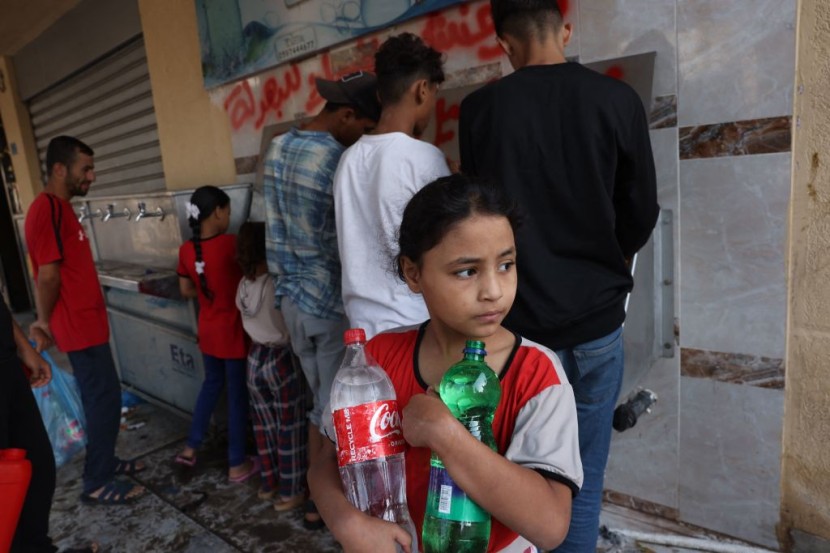
(Photo: by MOHAMMED ABED/AFP via Getty Images) EDITORS NOTE: Graphic content / A Palestinian girl carries bottles of water from a public water supply point, as raging battles between Israel and the Hamas movement continue for the sixth consecutive day in Gaza City on October 12, 2023. Thousands of people, both Israeli and Palestinians have died since October 7, 2023, after Palestinian Hamas militants entered Israel in a surprise attack leading Israel to declare war on Hamas in the Gaza Strip on October 8.
The Gaza Strip's shortage of clean water is causing serious health concerns.
Water is generally supplied to Gaza via a variety of sources, including a pipeline from Israel, desalination plants on the Mediterranean Sea, and wells. In the aftermath of the Hamas strikes, Israel shut off water, as well as the fuel and electricity that operate water and sewage installations.
The United Nations regards water access as a fundamental right since the human body needs a steady supply of water to survive. "Water is really the most important thing for maintaining your health," according to Dr. Tsion Firew, an emergency physician at Columbia University who has focused on water availability in humanitarian settings, as reported by The Associated Press.
According to the US National Academies of Science and Medicine, men need to drink around 3.7 liters (125 ounces) of water each day, while women need about 2.7 liters (91 ounces). The majority of it comes through drinking water or beverages, with around 20% coming from food, including fruits.
Many people, especially vulnerable populations such as children, the elderly, and those with medical concerns, can't go more than a few days without water, according to Firew. Dehydration can induce dizziness, weariness, and confusion, as well as organ failure and death in severe situations.
Water access is also important for sanitation, and a shortage of clean water can lead to the spread of diseases such as cholera and dysentery. Diarrheal infections caused by contaminated water are the greatest cause of death for children under the age of five worldwide, according to Firew.
Healthcare facilities are especially vulnerable since they rely on clean water to care for sick and injured patients.
The World Health Organization has warned that a lack of water is putting lives in peril as hospitals across the Gaza Strip struggle to care for thousands of patients.
Read also: Israel Attacks Hezbollah Terrorists in Lebanon as Gaza Ground Offensive Looms
Scarcity of Medical Supplies
According to the UK-based Medical Aid for Palestinians (MAP), hospitals in Gaza are experiencing a "catastrophic" scarcity of medical supplies due to Israel's "total blockade."
Hospitals in Gaza are functioning on external generators due to a power loss, a backup that is running out of time, according to the United Nations Relief and Works Agency for Palestine Refugees in the Near East (UNRWA).
This would put thousands of people in urgent danger, many of whom are already on the verge of death, such as kidney and cancer patients.
According to the UN Population Fund, 50,000 pregnant women in Gaza are currently unable to get health care since numerous hospitals have been bombed.
According to Fabrizio Carboni, the ICRC's regional director for the Near and Middle East, newborns in hospital incubators are also at imminent risk if power goes out.
According to UNRWA, there is a lack of body bags for the dead, and some have resorted to keeping dead remains in ice cream trucks.
Ashraf al-Qidra, a spokesperson for Gaza's health ministry, urged people to donate blood at Shifa Hospital, the enclave's largest.
Related article: Gaza Fuel Supplies Across Hospitals Run Out Amid Israel's Plan To Evacuate Civilians Near Lebanon Border








